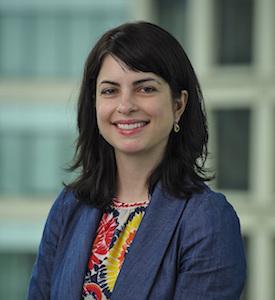
Credit: UT Southwestern
DALLAS – May 31, 2017 – Scientists have identified more than 100 genes linked to memory, opening new avenues of research to better understand memory processing in the human brain.
A study at the Peter O'Donnell Jr. Brain Institute includes the results of a new strategy to identify genes that underlie specific brain processes. This strategy may eventually help scientists develop treatments for patients with memory impairments.
"Our results have provided a lot of new entry points into understanding human memory," said Dr. Genevieve Konopka, Assistant Professor of Neuroscience with the O'Donnell Brain Institute at UT Southwestern Medical Center. "Many of these genes were not previously linked to memory, but now any number of labs could study them and understand their basic function in the brain. Are they important for brain development; are they more important for aspects of behavior in adults?"
The study published in Cerebral Cortex stems from previous research by Dr. Konopka that linked specific genes to resting-state brain behavior. She wanted to use that same assessment to evaluate brain activity during active information processing.
To do so, she collaborated with Dr. Bradley Lega, a neurosurgeon with the O'Donnell Brain Institute conducting memory research on epilepsy patients while helping to locate the source of their seizures. Dr. Lega maps the brain waves of these patients to understand what patterns are critical for successful memory formation.
Combining their techniques, the doctors found that a different group of genes is used in memory processing than the genes involved when the brain is in a resting state. A number of them had not previously been linked to any brain process, Dr. Konopka said.
Dr. Lega is hopeful the findings can help scientists better understand and treat a range of conditions involving memory impairment, from epilepsy to Alzheimer's disease.
He also hopes the study's success in combining genetics and cognitive neuroscience will encourage more scientists to reach beyond their areas of expertise to elevate their research.
"This kind of collaboration is not possible unless high-quality neuroscience research and academically minded clinicians are in close physical and intellectual proximity. I don't think either of us working or thinking independently would've come up with this type of analysis. Ideally, the O'Donnell Brain Institute will be a natural incubator for these sorts of collaborations for a number of neuroscience fields," said Dr. Lega, Assistant Professor of Neurological Surgery, Neurology and Neurotherapeutics, and Psychiatry.
###
The study was supported by UT Southwestern Jon Heighten Scholar in Autism Research, the National Institutes of Health, the James S. McDonnell Foundation 21st Century Science Initiative in Understanding Human Cognition Scholar Award, Friends of the Alzheimer's Disease Center at UT Southwestern, the David M. Crowley Foundation, and a UT BRAIN Initiative Seed Grant.
About UT Southwestern Medical Center
UT Southwestern, one of the premier academic medical centers in the nation, integrates pioneering biomedical research with exceptional clinical care and education. The institution's faculty has received six Nobel Prizes, and includes 22 members of the National Academy of Sciences, 18 members of the National Academy of Medicine, and 14 Howard Hughes Medical Institute Investigators. The faculty of more than 2,700 is responsible for groundbreaking medical advances and is committed to translating science-driven research quickly to new clinical treatments. UT Southwestern physicians provide care in about 80 specialties to more than 100,000 hospitalized patients, 600,000 emergency room cases, and oversee approximately 2.2 million outpatient visits a year.
This news release is available on our website at http://www.utsouthwestern.edu/newsroom.
To automatically receive news releases from UT Southwestern via email, subscribe at http://www.utsouthwestern.edu/receivenews.
Media Contact
James Beltran
[email protected]
214-648-3404
@UTSWNews
http://www.swmed.edu
############
Story Source: Materials provided by Scienmag





